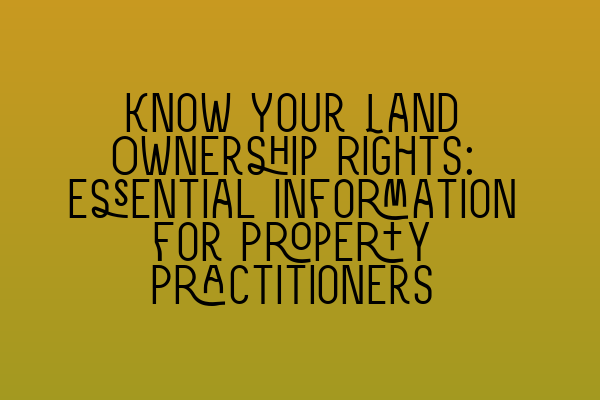Know Your Land Ownership Rights: Essential Information for Property Practitioners
As a property practitioner, it is crucial to have a deep understanding of land ownership rights. Land ownership is the foundation of property law, and a thorough knowledge of this subject is essential for providing effective legal advice to clients.
In this blog post, we will explore the key aspects of land ownership rights and provide you with the essential information you need to know as a property practitioner. So, let’s dive right in!
1. Freehold Ownership:
Freehold ownership is the most extensive form of land ownership, where an individual owns both the land and any buildings or structures on it. As a property practitioner, it is important to be familiar with the rights and responsibilities of freehold ownership, including the right to possess, use, and dispose of the land. Understanding the concept of freehold ownership will help you advise clients on issues such as boundary disputes, easements, and restrictive covenants.
2. Leasehold Ownership:
Leasehold ownership is another common form of land ownership. In this arrangement, the land is owned by the freeholder, but a leasehold interest is granted to the leaseholder for a specific period of time. As a property practitioner, it is vital to understand the rights and obligations of both the freeholder and the leaseholder. This knowledge will enable you to provide accurate advice on lease extensions, lease renewals, and leasehold enfranchisement.
3. Co-ownership:
Co-ownership refers to the ownership of land by two or more individuals or entities. This could be in the form of joint tenancy or tenancy in common. Understanding the different types of co-ownership and the respective rights and responsibilities of co-owners is crucial for property practitioners. It will allow you to handle cases involving disputes, partition, and severance of joint tenancy.
4. Registration of Land:
In the UK, land registration is an essential process that provides clear evidence of ownership and interests in land. It is important for property practitioners to have a comprehensive understanding of the land registration system, including the Land Registry and its functions. Familiarizing yourself with the registration process, requirements, and restrictions will enable you to effectively advise clients on matters such as adverse possession, voluntary registration, and rectification of title.
5. Legal and Equitable Interests:
In property law, there is a distinction between legal and equitable interests. Legal interests are those recognized by law and are capable of being registered, while equitable interests are enforceable by the courts based on principles of fairness and equity. Understanding the difference between these interests is vital for property practitioners, as it can impact the rights and remedies available to clients in cases involving trusts, mortgages, and beneficial interests.
6. Restrictive Covenants:
Restrictive covenants are legal obligations that restrict the use or development of land. As a property practitioner, you need to be familiar with the various types of restrictive covenants and their implications for property owners. Advising clients on issues such as enforcing or modifying restrictive covenants, drafting new covenants, and obtaining indemnity insurance against potential breaches requires a comprehensive understanding of this area of land ownership rights.
To further enhance your knowledge and preparation for the SQE exams, check out our related articles:
– SQE 1 Practice Exam Questions
– SQE 1 Practice Mocks FLK1 FLK2
– SQE 2 Preparation Courses
– SQE 1 Preparation Courses
– SRA SQE Exam Dates
In conclusion, having a solid understanding of land ownership rights is essential for property practitioners. Whether you are dealing with freehold or leasehold ownership, co-ownership, land registration, legal and equitable interests, or restrictive covenants, a comprehensive knowledge of these topics will enable you to provide effective legal advice to your clients. Keep expanding your knowledge, preparing for your exams, and staying up-to-date with the latest developments in property law to excel in your career as a property practitioner.
Remember, at SQE Property Law & Land Law, we are here to support you every step of the way. Contact us for expert guidance and preparation resources for the SQE exams.
